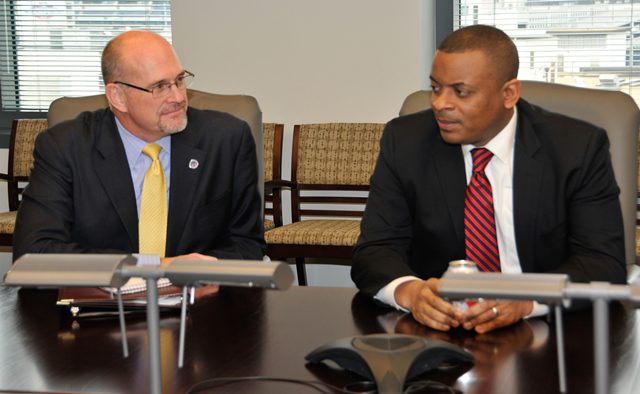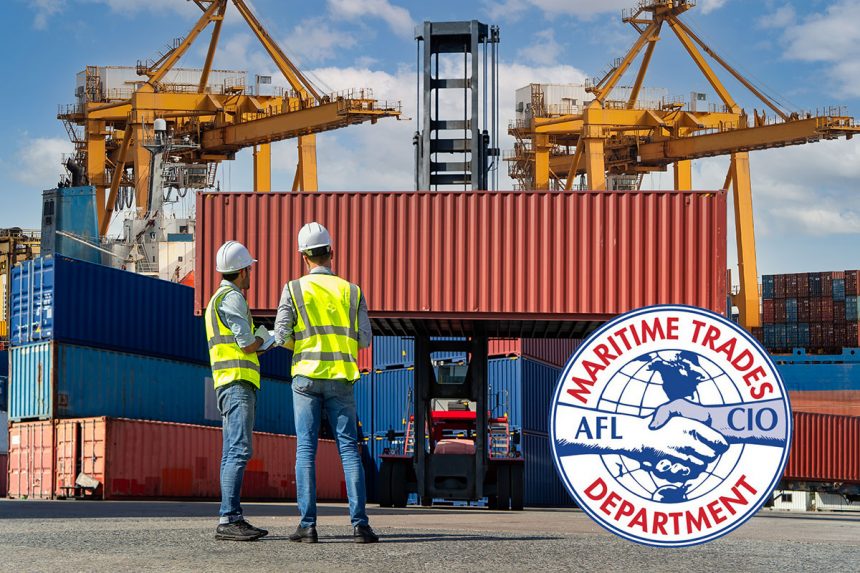
MTD board and Port Council representatives made sure the voices and concerns of America’s civilian mariners were heard when the U.S. Department of Transportation’s Maritime Administration (MarAd) hosted a three-day symposium in mid-January which the agency described as being “aimed at supporting the growth of the U.S. maritime industry and ensuring the availability of U.S.-flag vessels for our nation’s economic and national security.”
The officials from across the country attended the gathering Jan. 14-16 in Washington, D.C. Additionally, MTD President Michael Sacco and hundreds of mariners submitted written comments to the government docket associated with the symposium.
More than 200 people from all segments of the industry participated in the meeting, which included a number of breakout sessions and also featured remarks from Transportation Secretary Anthony Foxx, U.S. Rep. John Garamendi (D-CA), U.S. Rep. Duncan Hunter (R-CA), U.S. Transportation Command (TRANSCOM) Deputy Commander William Brown, Coast Guard Rear Adm. Joseph Servidio, Adam Yearwood of the Office of the Assistant Deputy Under Secretary of Defense (Transportation Policy), Acting Maritime Administrator Chip Jaenichen and many others.
“More than 75 percent of all U.S trade is transported by water, making maritime trade a critical part of our country’s economy,” said Foxx. “We must strengthen America’s ability to move products on the oceans, lakes, rivers and waterways, and chart a sustainable future course for the U.S. Maritime Industry.”
Garamendi called for continued support of the Jones Act, which he described as “foundational for a vibrant U.S. Merchant Marine.” He also said policymakers “need to recognize the U.S. Merchant Marine is a public-private enterprise.”
He added that new trades and new cargo must be found to revitalize the U.S. fleet, and emphasized that if oil and gas is to be exported from the U.S., “it must be on the bottoms of U.S.-flagged ships. Made in America is fundamental to any U.S. maritime strategy.”
Hunter – who like Garamendi addressed the MTD Convention last fall – reiterated his support for the industry and said he plans to help strengthen cargo preference laws where U.S.-flag shipments are concerned.
“We’re going to reverse a trend that’s been going on since the 1980s,” he said, adding that he also has long-term plans to beef up MarAd’s Title XI shipbuilding loan guarantee program, among other efforts.
Brown stated the military relies on the sealift capacity available through private American-flag ship operators and U.S. crews.
“It would take a lot of money to replace the capacity and capability” of those crews and vessels, he said.
Yearwood made similar points and said the Defense Department (DoD) regularly relies on mariners. He said the DoD depends on a healthy and viable U.S. Merchant Marine, and therefore supports developing a sound maritime policy. He also spoke in support of the U.S. Maritime Security Program (MSP) and its related Voluntary Intermodal Sealift Agreement.
“Without the U.S.-flag fleet, we cannot respond to contingencies,” he pointed out, using the industry’s highly praised efforts in Operation Iraqi Freedom and Operation Enduring Freedom as examples of civilian crews supporting our troops.
President Sacco reminded the symposium, “Since its founding, the United States has been and remains a maritime nation. The maritime industry directly affects all 50 states as well as the territories. The industry has provided American workers with good, steady, dependable jobs at sea and ashore. It is vital to the nation’s economic and defense interests.”
He called “for unwavering support for the Jones Act. The nation’s freight cabotage law has been the bedrock of American’s maritime policy.”
Sacco reiterated the department’s support for the MSP, for the nation’s cargo preference laws and for using U.S.-flag vessels to move LNG exports from the country.
In letters submitted by individual mariners, they stressed that any national maritime policy should start with protecting existing programs and laws – and any new ideas should build upon them, not replace them. These letters stated that proven laws and programs including the Jones Act, cargo preference, and the MSP are vital to national and economic security, and they help sustain large numbers of good American jobs.
Jaenichen thanked the participants and noted that the symposium, while important, is only “the first step in a year-long effort to develop a structured, systematic and inter-connected strategy that will strengthen and expand our nation’s maritime transportation system. We have come together to lay the foundation for a truly robust national maritime strategy – one that encompasses all aspects of our industry.”

